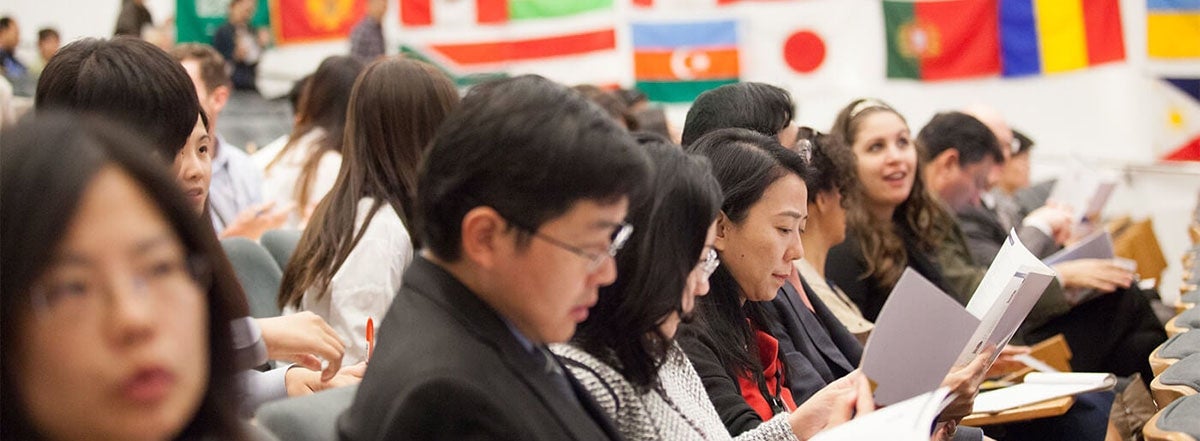Global Conferences
Academic and Research Conferences

The Los Angeles Global Health Conference, “Moving Towards Global Solidarity: Examining the Shared Impacts of COVID-19”
January 2023
After a three year hiatus due to the pandemic, the sixth annual Los Angeles Global Health Conference (LAGHC), “Moving Towards Global Solidarity: Examining the Shared Impacts of COVID-19,” took place both virtually and in-person at UCLA on Saturday, January 28, 2023. The 2023 conference, hosted in Southern California, brought together approximately 210 individuals who joined either in-person or virtually from various disciplines across academia, NGOs, business, and the public sector to discuss timely topics in global health and provided an interactive educational forum to discuss innovative ways to tackle health disparities—locally and globally. Home to individuals from more than 140 countries speaking 224 different languages, Los Angeles's rich cultural diversity makes it an ideal place to examine the current status of global health.
The LAGHC is organized by students from medicine, public health, and other disciplines from universities across Southern California, including UCLA, and, Kaiser Permanente, and others. The conference educates and connects with members of the Los Angeles communities on health equity topics in our own backyards and around the world.
Amidst the persistent devastation that the pandemic sparked across the world, we find ourselves in a new opportune landscape for global health. With this new landscape, we can collectively work to dismantle the deep social inequities underscored by the pandemic, utilize novel solutions to improve healthcare delivery, and lean on one another to support the mental well-being of our world as a whole. The 2023 conference was centered around three primary themes: health-system equity, social justice, and public health infrastructure; the window of opportunity for health technologies; and making mental health and well-being a global priority.
The opening keynote address, “ Achieving Global Solidarity by Leading with a Health Equity Lens, “ was delivered virtually by Dr. Matifadza Hlatshwayo Davis, MD, MPH, director of health for the City of St. Louis, and a national and international medical contributor on COVID-19 with a particular focus on marginalized populations. The afternoon keynote delivered by Dr. Patricia Gordon looked at “Closing the Gaps: Increasing Global Health Equity for Women Through Innovation Programs for Cervical Cancer Prevention.” Dr. Gordon graduated from UCLA School of Medicine in 1982 and worked as a radiation oncologist in Los Angeles for 28 years. Her commitment to saving women’s lives in low and middle-income settings led her to an additional career as a non-profit leader and international women’s health advocate. In 2014, she founded CureCervicalCancer, which trains local healthcare professionals to screen and treat women for cervical precancer. The organization has established 106 sustainable and ongoing CureCervicalCancer clinics in Kenya, Tanzania, Ethiopia, Nigeria, Haiti, Guatemala, Vietnam, and training programs in rural China – where help is needed most. In 2021, she was nominated as a Top 10 CNN Hero of the Year for her efforts to fight the global epidemic of cervical cancer.
The day also included numerous breakout sessions around the three key themes and included topics such as the impact of COVID-19 on our mental health, developing health technology peri-pandemic, COVID vaccination education in underserved communities, the impact of COVID-19 on the landscape of telemedicine, and impacts of COVID-19 on native communities.
The UCLA Anderson Center for Global Management was a silver sponsor of the event. Other sponsors included the UCLA International Institute, UCLA Health, UCLA David Geffen School of Medicine and its Global Health program, UCLA AIDS Institute, and The Promise Institute for Human Rights at the UCLA School of Law, among others.
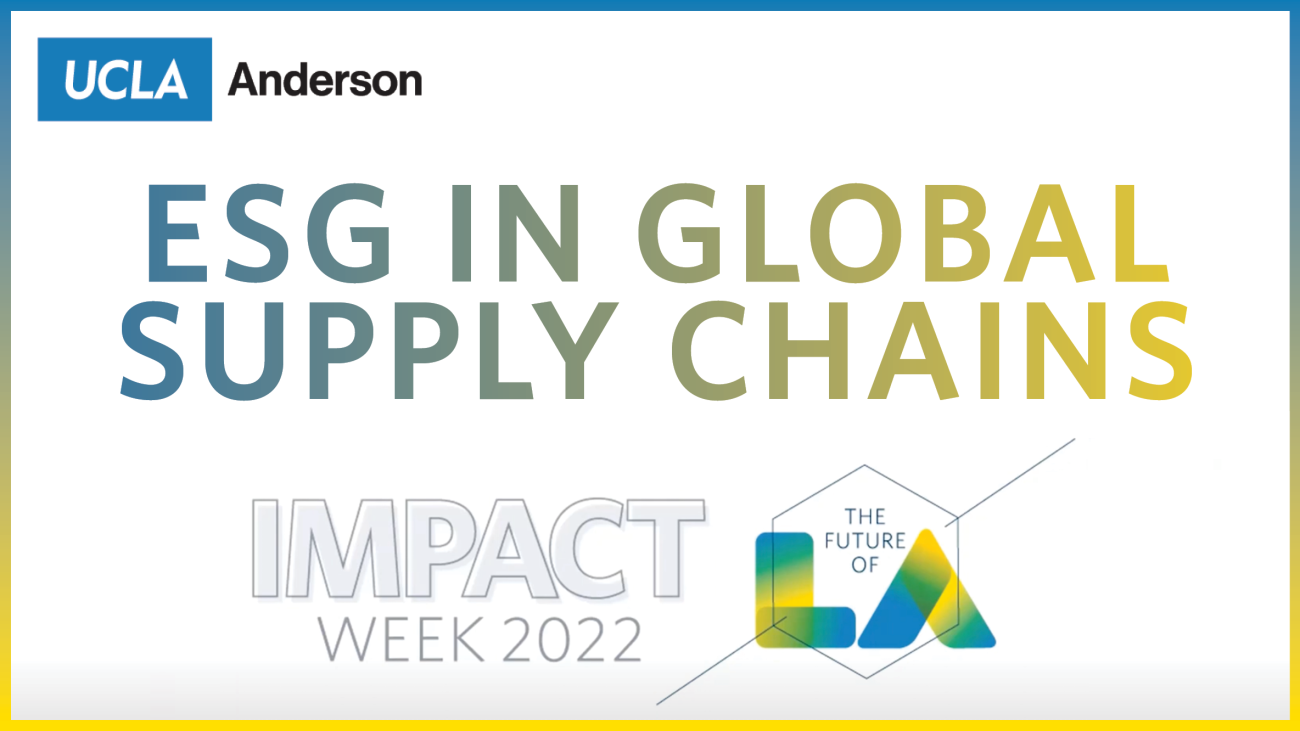
Impact Week 2022: ESG and Supply Chains – Uncovering the Blind Spots with Global Supply Chain Expert, Distinguished Professor Chris Tang
April 2022
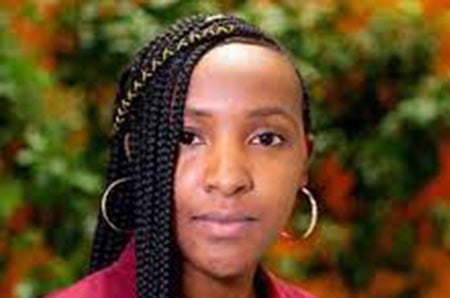
Africa’s Readiness for Climate Change (ARCC) Virtual Forum 2021
April 2021
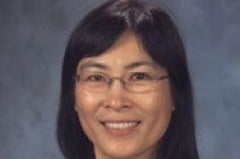
International Symposium on Global Chinese Entrepreneurship (Virtual)
November 2020
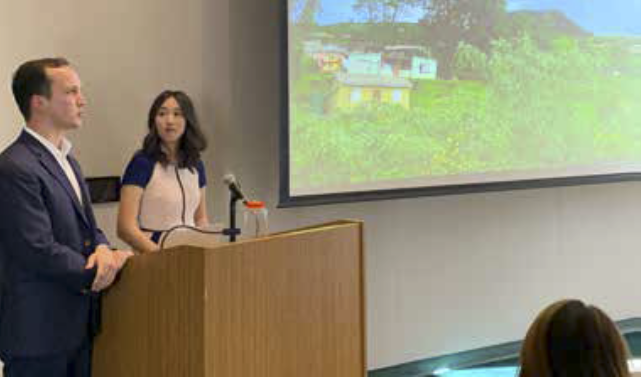
2020 and Beyond: Spotlight on a Shared Future
February 2020
The CGM sponsored the fifth annual Los Angeles Global Health Conference (LAGHC) at UCLA’s Covel Commons. “2020 and Beyond: Spotlight on a Shared Future” brought together around 300 people from various disciplines across academia, NGOs, business and the public sector to discuss the current status of world health and provided an interactive educational forum to address innovative ways to tackle health disparities — both locally and globally. The opening keynote address, “How Do You Eat an Elephant? Learning Lessons for a Shared Global Health Agenda,” was delivered by Elizabeth Anne Bukasi, MBCHB, M. MED, MPH, Ph.D., PGD, MBE, chief research officer of Kenya Medical Research Institute. The day also included numerous breakout sessions that explored topics such as global crises: epidemics, disasters and threats; innovation in global health: film and technology; vulnerable populations: migrant and refugee health; and gender equality and sexual and reproductive care.
Spencer Feliciano-Lyons and Connie Jiang (far right) from the full-time MBA Class of 2020 presented in a breakout session on “Bridging the Digital Divide in Sweetwaters, South Africa.” They discussed elements of their CGM supported AMR field study project with the Human Sciences Research Council, in which they were tasked with identifying a viable long-term solution to increase affordable data access to the impoverished rural community of Sweetwaters in South Africa that would in turn help to better understand barriers to entry of mHealth applications. The presentation addressed the digital divide, focused on the implications of the divide on human and social development, and demonstrated how business school students approach issues of global health. The LAGHC was organized by students from medicine, public health and other disciplines from universities across the region, including the UCLA David Geffen School of Medicine, Fielding School of Public Health, undergraduate departments and the USC Institute on Inequalities in Global Health, among others. The CGM was a silver sponsor.
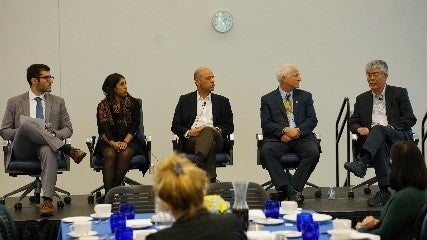
Immigration and Health Care: Status, Access and Bridging the Disparity
February 2019
The 23rd annual UCLA Health Care Symposium, whose 2019 theme was “Immigration and Health Care: Status, Access and Bridging the Disparity,” explored the relationship between immigration and the health care system, and addressed how social justice is a means to improving access to health care among immigrants in the United States. The symposium brought together students, physicians, administrators, public health leaders and members of the local community. It helped to increase awareness of immigration as a public health issue and encouraged discussion on working together to end barriers to health care access and finding solutions to the health care disparities. The symposium is an expression of interest and excitement on the part of UCLA medical students ― who believe that students of all levels can be valuable contributors to the conversations that are reshaping our health care system and, consequently, our health. The CGM was a sponsor of the symposium, together with various cross-campus units such as UCLA Health, the Semel Institute for Neuroscience and Human Behavior, the Fielding School of Public Health and the UCLA International Institute.
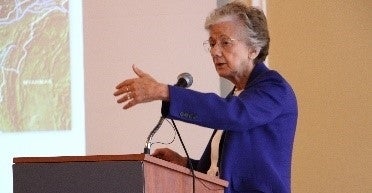
Water in the Middle East and Africa: A Nexus of Cooperation and Conflict
May 2018
UCLA hosted the inaugural international and interdisciplinary conference, “Water in the Middle East and Africa: A Nexus of Cooperation and Conflict.” The event brought together scholars and practitioners to address one of the most critical challenges of our time: water security. It was organized around three broad topics — food security, health and environment, and the geopolitics of water — with an understanding that these issues overlap and intersect. Speakers contributed a breadth of expertise and perspectives, from the vantages of engineering, earth system science, urban planning, public health, law, international relations and conflict resolution. The conference was open to students and scholars, professionals from industry and nonprofit organizations, government officials, and members of the general public interested in enriching their knowledge of the issues surrounding water scarcity and the innovative technology and policy solutions that will help to ensure a water-secure future. The keynote address on “Climate Change, Oceans and Human Health” was delivered by Distinguished University Professor Rita Colwell, whose interests at the University of Maryland College Park and as an adjunct professor at John Hopkins University are focused on global infectious diseases, water, and health. The conference was organized by a variety of cross-campus partners, led by the UCLA Y&S Nazarian Center for Israeli Studies. Partners included the Center for Global Management, UCLA Africa Studies Center, UCLA Center for the Study of International Migration, UCLA Center for Middle East Development, UCLA Henry Samueli School of Engineering and Applied Science, the UCLA Luskin School of Public Affairs and the Luskin Center for Innovation, as well as the UCLA Water Resources Group and the UCLA Water Technology Research Center.
